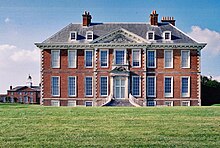Matthew Fetherstonhaugh
Sir Matthew Fetherstonhaugh, 1st Baronet, FRS (/ˈfɛðərstənhɔː/; c. 1714[1] – 18 March 1774) was an English politician and landowner.


He was the son of Matthew Fetherstonhaugh of Featherstone Castle, Northumberland. In 1746, he inherited the estates of a kinsman Sir Henry Fetherston but not Sir Henry's baronetcy which became extinct on his death. However, on 3 January 1747, Fetherstonhaugh was created a baronet of Featherstonehaugh in the County of Northumberland, in the Baronetage of Great Britain.
On his marriage to Sarah Lethieullier, sister of Benjamin Lethieullier, in December 1746,[2] he bought Uppark, Sussex and the manors of East And West Harting and in 1747 sold the family estate at Featherstone to James Wallace. Between 1748 and 1753 he undertook the Grand Tour with his brother-in-law Benjamin Lethieullier and his step brother-in-law Lascelles Iremonger. They brought back to Uppark an impressive collection of Italian art.[3]
He served as a Member of Parliament (MP) for Morpeth from 1755 to 1761 and for Portsmouth from 1762 to 1774.
In the 1750s he commissioned architect James Paine to design and build Dover House, Whitehall, London.
He was succeeded by his son Henry.
References
- ^ Jeremy Black, "The British and the Grand Tour", (1985), p122
- ^ "Sarah Fetherstonhaugh (Lethieullier)". Geni.com (family history builder, with refs). Retrieved 14 May 2018.
- ^ Art UK – National Trust, Uppark
Sources
- A History of Northumberland (1840) John Hodgson Pt 2 Vol 3 p355
- Leigh Rayment's list of baronets
